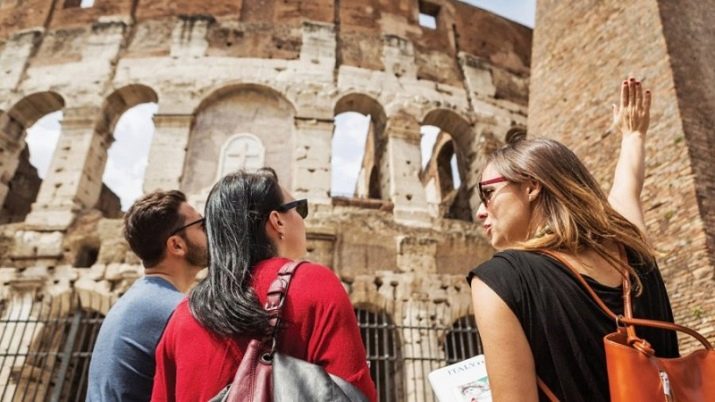It seems to many that working as a guide does not require special knowledge, skills, and anyone can engage in this activity. And only after delving into the intricacies of the profession presented, it becomes clear how difficult it is to conduct excursions, communicate with tourists of different nationalities and be able to find an approach to them.
Features
Until the end of the 60s of the twentieth century, as a profession, a guide in the Soviet Union was not. Their functions were performed by amateur enthusiasts on a free basis. Most often, school teachers, teachers from universities, museum staff were involved in conducting excursions.
Sometimes, students and citizens who knew the historical features of their city were attracted to oversee groups of foreign tourists. And only in 1969 it was decided to develop tourism and excursion business in the Union.

Today the guide is a person showing tourists the historical parts of the city. He should not only talk about sights and organize meals, but also be able to properly plan a schedule for visiting museums and cultural objects. With a guide it is much more interesting to get acquainted with architectural masterpieces, to visit exhibitions, visit galleries and much more. For comfortable communication with tourists from other countries, the guide must speak several languages.
Quite often, guides are confused with guides. Many people think that these names speak of the same profession. This is actually not the case.
Guide and guide are two different jobs with similar characteristics. According to the standard of the profession, they conduct excursions to the historical sights of the city, take tourists to museums and introduce them to architectural monuments. A guide is a person who is an abnormal unit of travel agencies. His duties include a sightseeing tour of a group of tourists to the sights of the city. But the most important thing is that he must accompany the supervised foreigners throughout the tour.
From a theoretical point of view, the guide and the guide differ from each other. Most often, the guide has great knowledge and wide horizons. But the guides are highly qualified specialists in narrow issues. Some well know the detailed history of the Renaissance, while others have knowledge in the space direction. Quite often, guides who decide to change their occupation consider the work of a guide, and vice versa.

Responsibilities
The duties of the guide include many of the requirements that are prescribed in the job description.
- Search for historical materials with their subsequent study. Tour guides often spend their free time in city archives.
- A person must constantly improve his oratorical abilities, learn new techniques for his narratives. To be able to answer questions and most importantly - not to be afraid of public speaking.
- The guide must know detailed information about the group of tourists, the time of their arrival at the place. He is obliged to meet them, to make sure that no one is behind the group. The guide must keep documentation, fill out the minutes of events.
- His duty is to develop the most convenient route for the tour.
- The guide must enthusiastically talk about expositions in the museum or architectural structures in order to interest tourists.
- He should inform tourists about safety precautions and precautions when getting acquainted with the exhibits.
- The guide must give tourists the answer to any question, except personal.
- The duties of the guide include filling out relevant documents.
- If the tourist is injured or suddenly feels unwell, the guide must provide him with medical care, as well as call the doctors or take him to the nearest hospital.
- The guide must be psychologically stable and in case of unforeseen situations that pose a danger to the lives of tourists, be able to eliminate panic and call the appropriate services.
- At the end of the tour, the guide must arrange the departure of tourists, check their documents, tickets, cash.
Compliance with the professional standard is an indicator of competence, which makes the applicant for the position of a guide a top-level specialist.

What should I know and be able to?
People who decide to devote themselves to the profession of a guide should have a lot of knowledge and skills:
- fluent in several foreign languages;
- have higher education in the humanities;
- be able to find a common language with strangers;
- well versed in the topics of excursions;
- know local history, ethnography, cultural studies and other similar sciences.
There are certain requirements for people who want to take the position of a guide. They must have the talent to correctly express and articulate their own thoughts.
- This person should clearly pronounce complex words, be able to emphasize, maintain the style of speech and not use parasitic words.
- Provide information in an understandable manner without spelling out historical data in complex terms. Obsolete obsolete words should not be used.
- To increase the interest of tourists, the guide must expressively present information. It is allowed to use epithets, metaphors and allegories.
- It is strictly forbidden to use words that do not correspond to the literary language.
It is worth noting that the specialist in excursions must constantly monitor his speech.The use of unnecessary words and empty phrases reduces the interest of the tourist audience.

What qualities does it have?
In addition to professional skills, the guide must have certain personal qualities.
- Have a great imagination and be able to think figuratively. Possessing such qualities, the guide can describe objects located at a far distance, simply presenting the picture in his head.
- An important personal quality is bias. People with it skillfully bring their opinions to the public.
- The guide should be eloquent. Such people easily find the necessary words to get out of unusual situations.
- Purposefulness is a special quality. This suggests that a person is ready to improve and improve their professional status.
- The appearance of the guide should be neat, modest, but not repulsive.

Education
To become a guide it is necessary to get an education that is provided at the historical faculties of universities with a degree in History and Museum Studies. After graduating, university graduates go through additional courseswhere they learn the intricacies of the profession. Mandatory subjects when passing the exam for admission to the Faculty of History - History, Russian, social studies. In some cases, guides become people who have completed only special courses. However, their work is not permitted everywhere.
If a person wants to become a professional guide and receive decent pay for his work, he should go through several stages of training.
- Finish high school and get a document confirming the availability of higher education. In this case, you need to simultaneously study foreign languages.
- Having a document confirming graduation, you can go to specialized courses for continuing education, working on the basis of museums.
- After successful passing the exams for professional suitability, the guide receives accreditation for the implementation of activities.

Where does it work?
Professional guides are widely in demand in large cities and resort cities. But do not forget that it's seasonal work. It’s not difficult to get a job, only the main part of the work with the corresponding profit will fall in the spring and summer. Promotion on a career ladder at each expert happens differently. With the necessary experience and a small starting capital, you can open your own travel agency, where several guides will work.
Salary issue depends on many factors.. Luring tourists from the street, the daily profit can be 2.5-3 thousand rubles. If the guide works in the company, his monthly income, taking into account gratuities, averages 80 thousand rubles. Specialists representing travel agencies or hotels under an agreement receive about 2-3 thousand rubles a day. According to their description, this type of work is simpler and very pleasant. There are few tourists, every second tip. The main thing - obtain a license to conduct such activities. Well, if the guide will be sent abroad as an escort of tourists, his daily rate increases by 2, or even 3 times. But the requirements for such candidates are very high, and the competition is felt much stronger.
Starting a career is recommended with the State Museum. Perhaps the first steps in working life seem dull and dull. You will have to walk to different halls, drive groups of people and talk about the culture of different eras, like a university lecturer.
But this is only the first step, then more. Several certifications, and your skill is already in line with the professional standard, and you can drive groups of foreign tourists.











